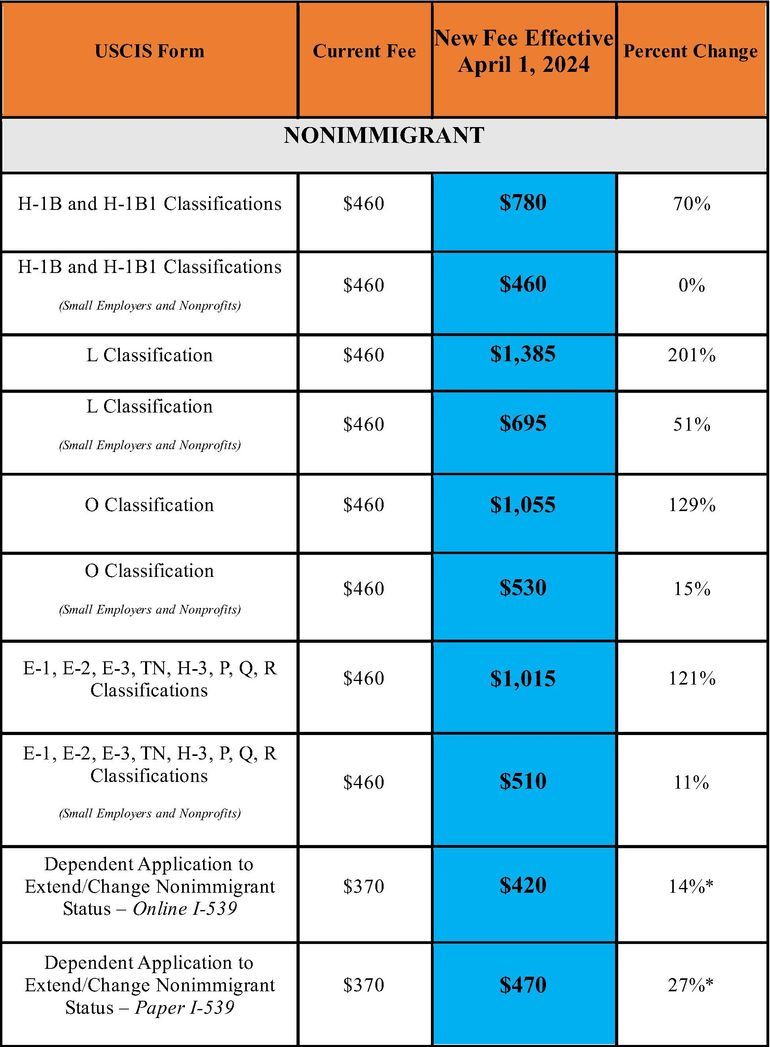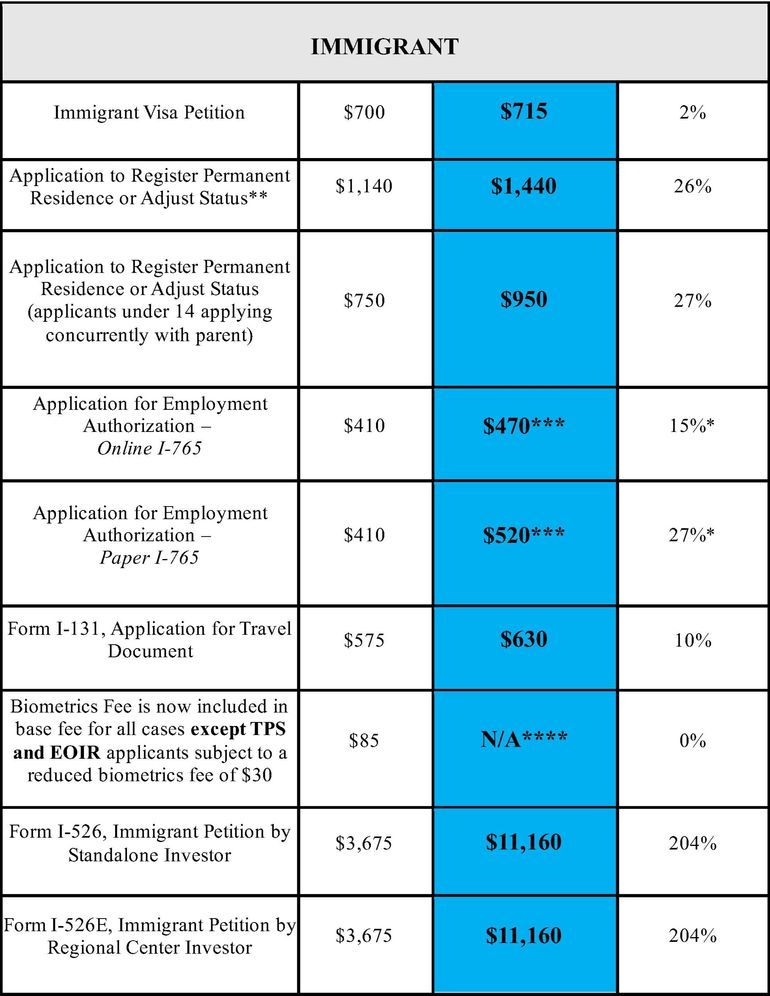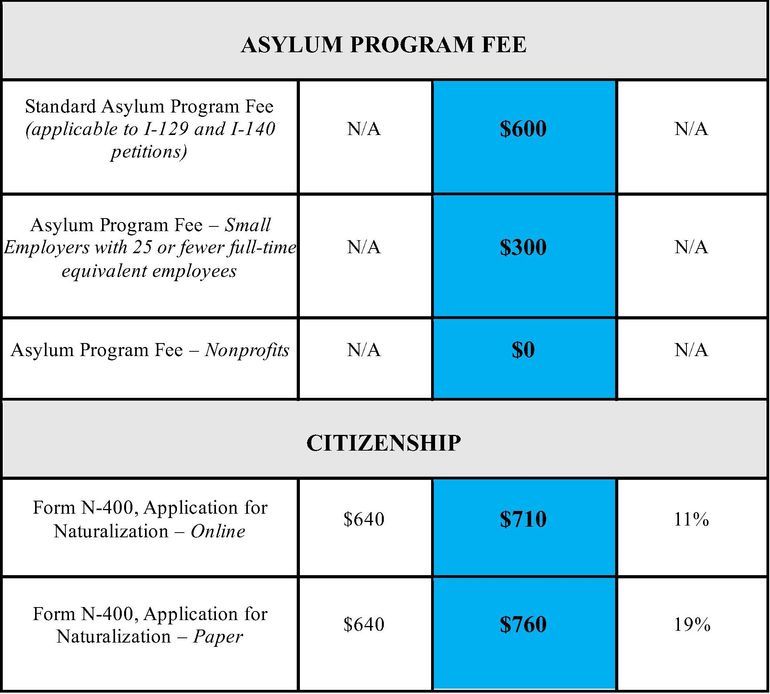Seyfarth Synopsis: Effective April 1, USCIS will implement significant filing fee increases, in particular for petition and applications related to employment-based benefits.
U.S. Citizenship and Immigration Services (USCIS) published a final rule, which will take effect on April 1, 2024, to adjust certain immigration and naturalization benefit request fees. Through this rule, USCIS will implement substantial fee increases especially for employment-based petitions, reshaping the cost landscape for immigration benefits.
Key Takeaways:
1. H-1B Cap Registration Fee Increase: USCIS will substantially increase the H-1B cap registration fee from $10 to $215 per registration, a 2050% surge, effective March 2025 for the FY 2026 cap season and beyond. The fee of $10 remains in effect for this year, the FY 2025 cap season. This change is part of USCIS’s initiative to align fees with the operational costs linked to the administration of the H-1B registration system.
2. New Asylum Program Fee for Employment-Based Visas: USCIS will implement a $600 Asylum Program Fee for I-129 and I-140 petitions, with a reduced fee of $300 for small employers, defined as those with 25 or fewer full-time employes, and exempting nonprofit employers.
3. Fee Changes for Form I-129, Form I-140, and Form N-400: USCIS will significantly change the filing fees associated with various immigration forms, particularly impacting Form I-129, Petition for a Nonimmigrant Worker, Form I-140, Immigrant Petition for Alien Workers, and Form N-400, Application for Naturalization. Please find below a detailed breakdown of the fee changes and their implications:
Form I-129:
Under the current fee schedule, USCIS requires the same $460 filing fee for all classifications using form I-129, including for example H-1B, L-1, TN and E-3. Through the final rule, USCIS will impose different filing fees for different classifications, as fully outlined in the chart below. For example, the Form I-129 filing fee for an H-1B petition will rise by 70%, reaching $780 from $460, and the L-1 petition filing fee will rise by 201%, reaching $1,385 from $460. Certain exemptions and reduced fees may apply to small employers and nonprofit organizations, providing a nuanced fee structure based on the size and nature of the petitioner. These increases do not include the new Asylum Program Fee described above. In addition, for certain H-1B and L-1 petitions, the USCIS Fraud Prevention and ACWIA fees remain unchanged.
Form I-140:
USCIS will impose a nominal 2% increase from $700 to $715 for I-140 petitions. These increases do not include the new Asylum Program Fee described above.
Form N-400:
The USCIS fee rule includes adjustments to the filing fee for Form N-400, the application for naturalization. Under the revised fee schedule:
- Form N-400, Application for Naturalization (online filing), previously priced at $640, will increase by 11% to $710.
- Form N-400, Application for Naturalization (paper filing), formerly priced at $640, will increase by 19% change to $760.
4. Premium Processing Timeline Change: USCIS will extend the premium processing adjudication period from 15 calendar days to 15 business days, providing USCIS more time to adjudicate petitions, which will impact planning for immigration filings. In addition, the new fees for premium processing requests will take effect on February 26, 2024. For more details, please see our client alert–U.S. Citizenship and Immigration Services Increases Premium Processing Fees–here.
5. New Process and Fees for Adjustment of Status Applications: USCIS will implement a fee of $1,440 for most adjustment of status applications, featuring a reduced fee of $950 for applicants under 14 applying concurrently with a parent. This fee structure marks a departure from the initially proposed $1,540 adjustment filing fee, retaining USCIS’s tradition of offering reduced fees for applicants filed by children.
Notably, the agency will unbundle I-765, Application for Employment Authorization (EAD) and I-131, Application for Travel Document (Advance Parole, or AP) fees from the adjustment of status filing fee. Under the current fee structure, the adjustment fee covers associated EAD and advance parole applications. The new fee schedule mandates separate charges for these documents. USCIS will charge a reduced fee of $260 for EAD applications filed concurrently with the adjustment application, and for EAD renewals during the pendency of the adjustment. Applicants, however, will pay $630 for initial AP and subsequent renewals, with no discounts for concurrent filing with adjustment applications or renewals during the adjustment process.
Summary of New Fees for Common Employment-Based Petitions:
The below chart details current and proposed fees for common employment-based petitions. It excludes statutory fees. Employers will be subject to the following new fees for common employment-based and related application types as of April 1, 2024:



*The percentage reflects the change from the current base filing fee, exclusive of separate biometrics fee, which will now be included in the new base filing fee.
**For adult applicants, exclusive of separate biometric fee, which will now be included in the new base filing fee.
***Adjustment of status applicants will pay half the standard I-765 fee if they paid the full fee for a concurrently filed or pending adjustment application.
What Employers Could Do to Prepare for the Change:
Based on the response to the 2020 Final USCIS Fee Rule, there is good reason to expect that one or more court challenges will be brought against this newest rule, which could delay or ultimately prevent its implementation. Nevertheless, sponsoring employers must anticipate the budget impact, consider the extended premium processing timeline, and familiarize themselves with updated USCIS forms that will be mandatory as of April 1, 2024. We encourage clients to work with your Seyfarth Shaw legal team to submit cases before April 1 to benefit from the current fee structure and form editions. Strategic planning is crucial amid this transformative adjustment in the immigration landscape.